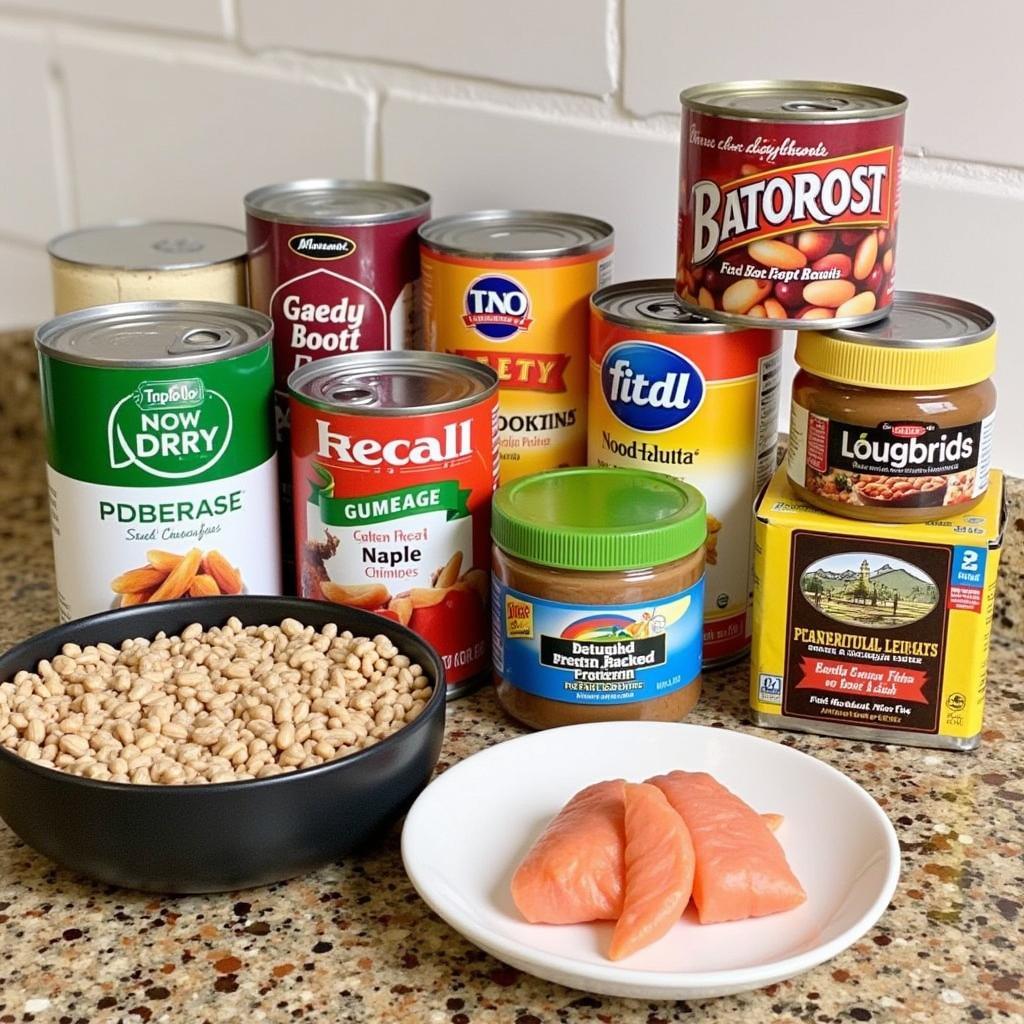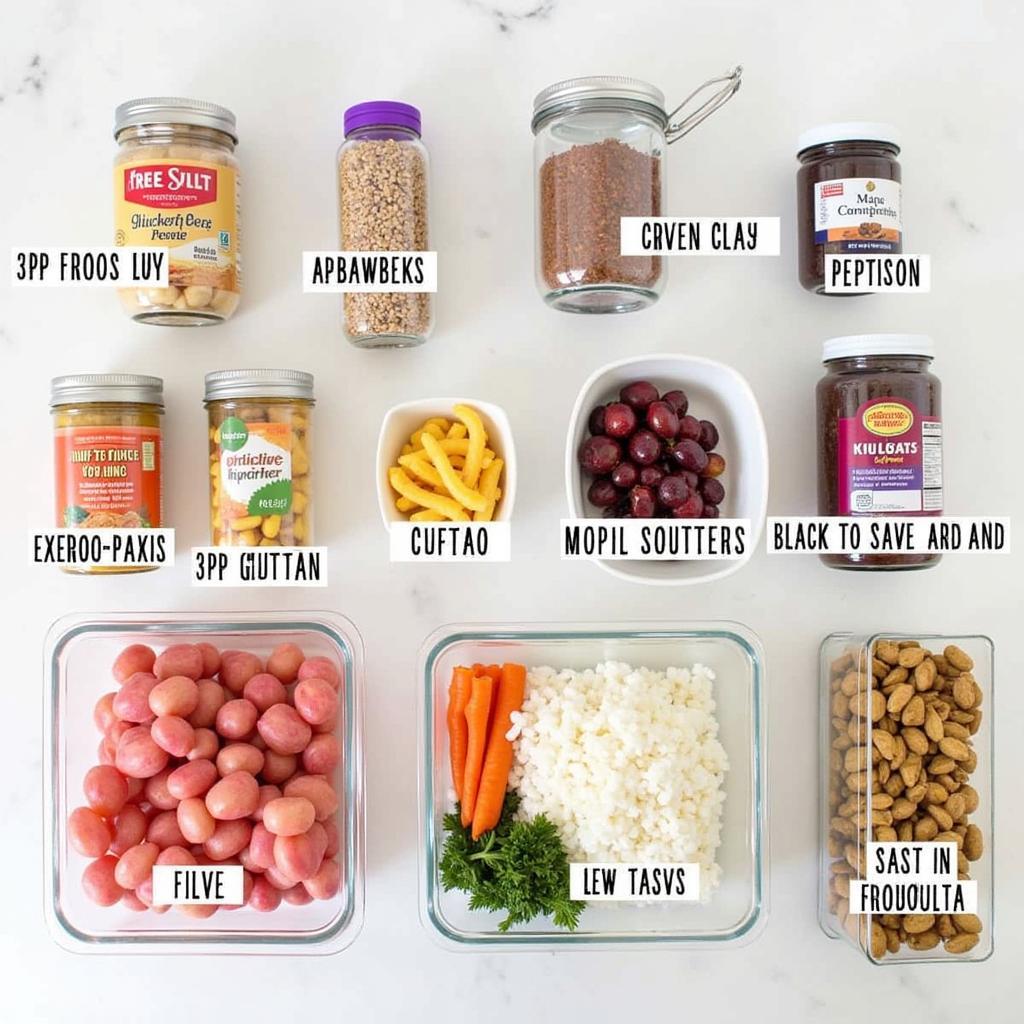Stocking your pantry with the Best Gluten Free Emergency Food is crucial for anyone with celiac disease or gluten sensitivity. In times of crisis, access to safe and nutritious food can be limited, making preparedness even more important. This comprehensive guide will walk you through choosing, storing, and utilizing gluten free emergency food options to keep you feeling your best, even when facing the unexpected.
Understanding Your Gluten Free Emergency Food Needs
Before diving into specific products, it’s essential to consider your individual needs and preferences.
- Dietary Restrictions: Do you have any allergies beyond gluten, such as nuts, dairy, or soy?
- Taste Preferences: What types of cuisines or flavors do you enjoy?
- Calorie Requirements: Calculate your daily calorie needs based on your age, gender, and activity level.
- Storage Space: How much space do you have available for storing emergency food?
- Budget: Set a realistic budget for building your gluten free emergency food supply.
Essential Gluten Free Emergency Food Categories
To create a balanced and satisfying emergency food supply, aim for a variety of options across different food groups.
1. Grains and Starches
- Rice: White rice, brown rice, and wild rice are naturally gluten free and offer long shelf lives.
- Quinoa: This complete protein source is a good source of fiber and iron, making it a nutritious choice.
- Gluten Free Oats: Choose certified gluten free oats to avoid cross-contamination.
- Corn Products: Cornmeal, polenta, and gluten free corn tortillas are versatile options for various meals.
2. Protein Sources
- Canned Beans and Lentils: These pantry staples are packed with protein, fiber, and essential nutrients.
- Canned Fish: Tuna, salmon, and sardines are excellent sources of protein and omega-3 fatty acids.
- Nut Butters: Choose single-ingredient nut butters, like peanut butter or almond butter, for a long shelf life.
- Seeds: Chia seeds, flax seeds, and hemp seeds are nutrient-dense additions to smoothies or yogurt.
 Gluten Free Protein Sources
Gluten Free Protein Sources
3. Fruits and Vegetables
- Canned Fruits: Opt for fruits canned in their own juice or water for a healthier choice.
- Dried Fruits: Raisins, apricots, and mangoes offer a concentrated source of energy and nutrients.
- Canned Vegetables: Choose low-sodium or no-salt-added options whenever possible.
- Freeze-Dried Vegetables: These lightweight options rehydrate well and retain their nutritional value.
4. Other Essentials
- Gluten Free Energy Bars: Choose bars with a good balance of protein, carbohydrates, and healthy fats.
- Gluten Free Crackers: Look for options with a long shelf life and minimal added ingredients.
- Water: Store at least one gallon of water per person per day for drinking and sanitation.
“Having a well-stocked pantry with a variety of gluten free options is essential for peace of mind,” says Sarah Jones, a registered dietitian specializing in celiac disease. “Prioritizing nutrient-rich choices will help you stay healthy and energized during emergencies.”
Tips for Storing Gluten Free Emergency Food
- Check Expiration Dates: Regularly rotate your stock, using older items first.
- Store in a Cool, Dry Place: Protect your food from extreme temperatures and moisture.
- Use Airtight Containers: Prevent spoilage and keep pests out.
- Label Everything Clearly: Include the product name and expiration date for easy identification.
Gluten Free Travel Food and Free Survival Food Samples
Preparing for unexpected situations extends beyond your pantry. When traveling or seeking additional resources, consider these options:
- Gluten Free Travel Food: Pack your own snacks and meals to ensure safe and enjoyable dining experiences on the go. Learn more about gluten free travel food here.
- Free Survival Food Samples: Explore reputable companies offering free survival food samples to try before you buy and expand your emergency preparedness kit. Discover free survival food samples here.
 Organizing Gluten Free Emergency Food
Organizing Gluten Free Emergency Food
Conclusion
Building a supply of the best gluten free emergency food provides peace of mind and ensures your nutritional needs are met during unforeseen circumstances. By considering your individual requirements, choosing a variety of shelf-stable options, and implementing proper storage techniques, you can confidently face any situation while adhering to your gluten free diet. Remember, preparedness is key to staying safe and healthy, no matter the challenge.
FAQs
1. How long does gluten free emergency food last? Shelf life varies depending on the product. Always check expiration dates and rotate your stock regularly.
2. Can I use regular oats for emergency preparedness? No, regular oats are often cross-contaminated with gluten. Choose certified gluten free oats to avoid any issues.
3. What should I do if I run out of gluten free food during an emergency? Contact local food banks or emergency relief organizations for assistance.
4. Are there any specific water filtration systems recommended for gluten free individuals? Most water filtration systems effectively remove contaminants, including gluten. Choose one that meets your needs and budget.
5. Where can I find more information about gluten free emergency preparedness? Reputable organizations like the Celiac Disease Foundation and Beyond Celiac offer valuable resources and guidance.
Need further assistance?
For personalized advice on choosing the best gluten free emergency food or any questions related to gluten free living, don’t hesitate to contact us. Our dedicated team is available 24/7 to support your journey. Reach us at:
Phone: 0972669017
Email: [email protected]
Address: 142 Trần Nhân Tông, Yên Thanh, Uông Bí, Quảng Ninh, Việt Nam
Let us help you navigate the world of gluten free living with confidence and ease.